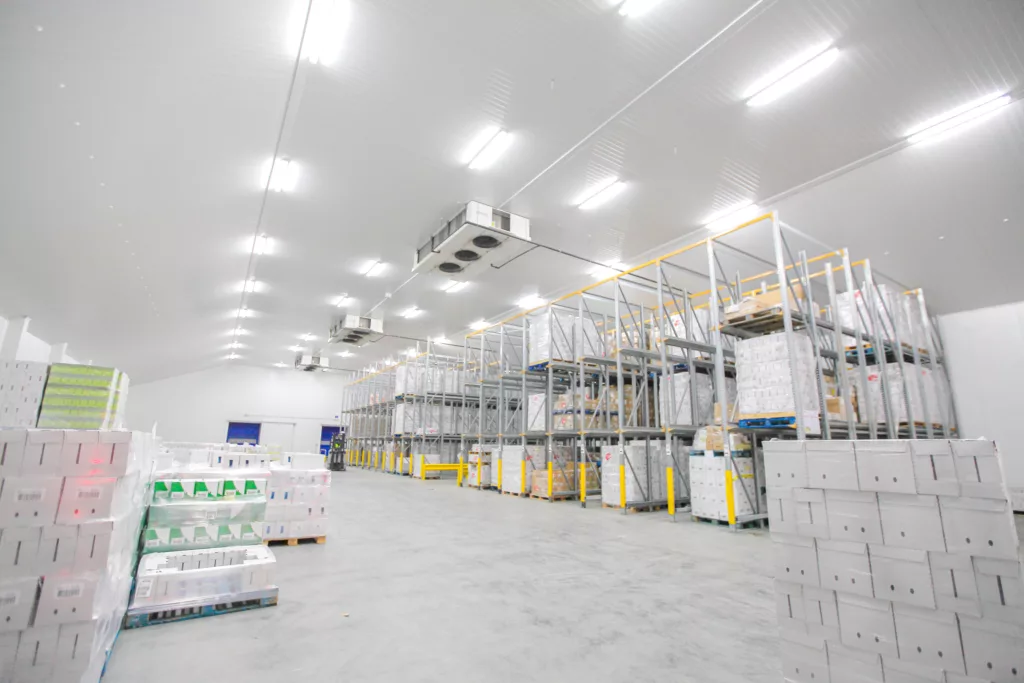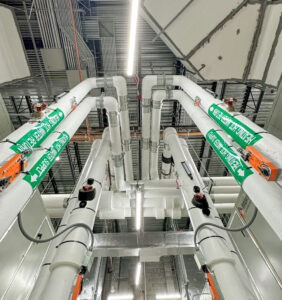Refrigeration systems are a critical component in the daily operation of fulfillment centers, grocery stores, cold storage warehouses, pharmaceutical and bio-pharma cold distribution centers.
These systems require a complex electrical process connecting to various control systems allowing refrigeration equipment to function effectively and efficiently.
Whether constructing a brand-new facility or renovating an existing one, the design and installation are critical elements of any refrigeration project.
Electrical Design for Refrigeration Projects
Refrigeration systems are inherently power-intensive and therefore require a well-designed electrical system capable of handling the high electricity demand.
The electrical design process entails creating and defining the electrical elements of a system while determining power supply, load capacity, voltage, current, and electrical safety standards. In addition, design defines a material list such as wiring, motors, switches, and controllers to ensure they comply with the system’s specifications.
The designer must also consider the equipment’s electrical load capacity to prevent the electrical system’s overload. Overloading can cause equipment failure, tripping of circuit breakers, and even electrical fires.
Electrical Design: Material Selection a Crucial Element
Material selection is regarded as one of the most crucial elements in the design phase. In refrigeration projects, designers must consider the unique temperature requirements of cold storage spaces, which differs from the ambient temperature of the rest of the building. As a result, designers must carefully choose specific materials best suited for a particular type of application.
For instance, the cold storage sections of food processing facilities or certain fulfillment centers are frequently sanitized with various solutions to prevent contamination of food products and the spread of harmful pathogens on surfaces and equipment. Hence, designers must choose materials with adequate weatherproofing and proper insolation. Materials such as receptacles, switches, and lights must be weatherproofed.
The selection of suitable electrical trade materials is crucial to guarantee the efficient and effective operation of refrigeration systems.
For electrical wires, insulated sleeves are utilized to prevent energy transmission, and condensation, which helps to maintain a suitable interior temperature.
Selecting the right electrical materials is crucial for the success of refrigeration projects. Conversely, using inadequate components can result in significant negative outcomes, including equipment failure, safety hazards, and costly operational downtime.
Electrical Sustainable Design a great ROI
- Reduce the energy consumption of the refrigeration system.
- Lower operating cost.
- Minimize the carbon footprint.
- Reduce maintenance facility costs.
Electrical Contracting: Critical Component in the Construction of a Refrigeration Systems.
Another critical aspect of electrical contracting capabilities in refrigeration projects is contracting and installation. From a contracting standpoint employing an experienced crew to supervise and perform the work can avoid any installation flaws that can lead to significant issues like temperature fluctuations, inefficient cooling, or even complete system failure. In addition, Refrigeration systems use various electrical components that can be hazardous if not installed correctly.
Electrical contractors have the knowledge and experience to ensure that all electrical connections and components are installed safely and in compliance with local codes and regulations.
Summary
In summary, refrigeration systems are crucial components in various industries, including but not limited to fulfillment centers and cold storage facilities. The design and installation of these systems are critical elements of any refrigeration project. The electrical design process involves creating and defining the electrical elements of a system while considering power supply, load capacity, voltage, current, and electrical safety standards.
Material selection is a crucial element in the design process, and selecting the right electrical materials is crucial for the success of refrigeration projects and its daily operations. Incorporating sustainable designs can optimize performance and reduce the average construction footprint.
Finally, contracting and installation are critical aspects of electrical capabilities in refrigeration projects, and employing experienced electrical contractors is essential to ensure that all electrical connections and components are installed safely and in compliance with local codes and regulations.





